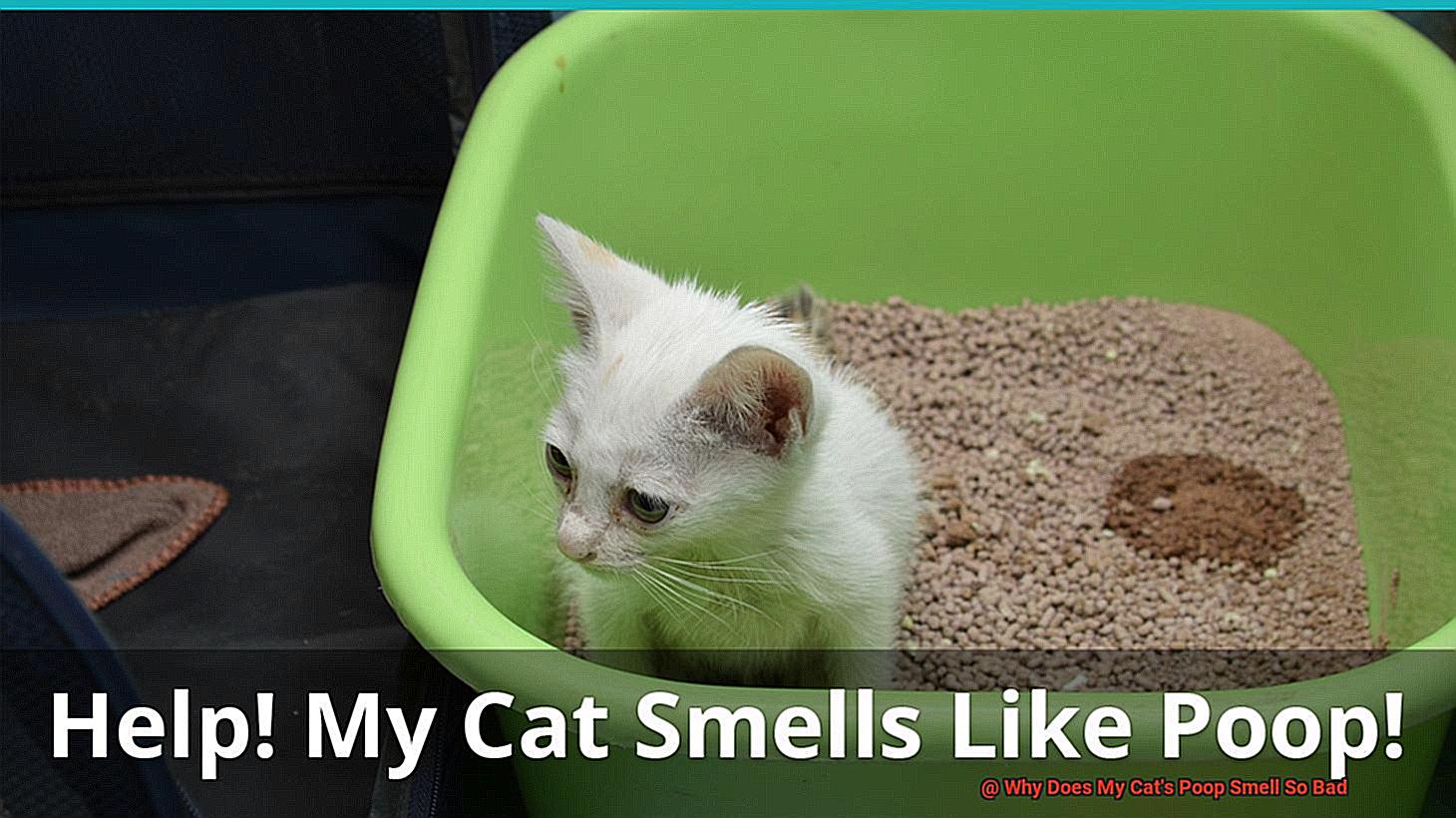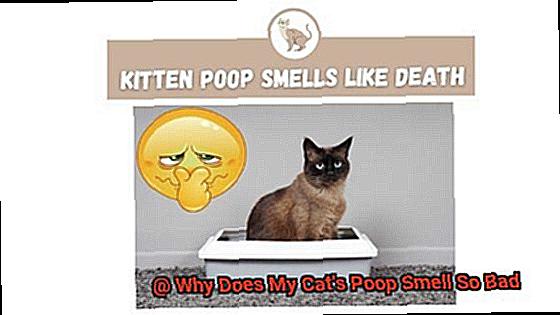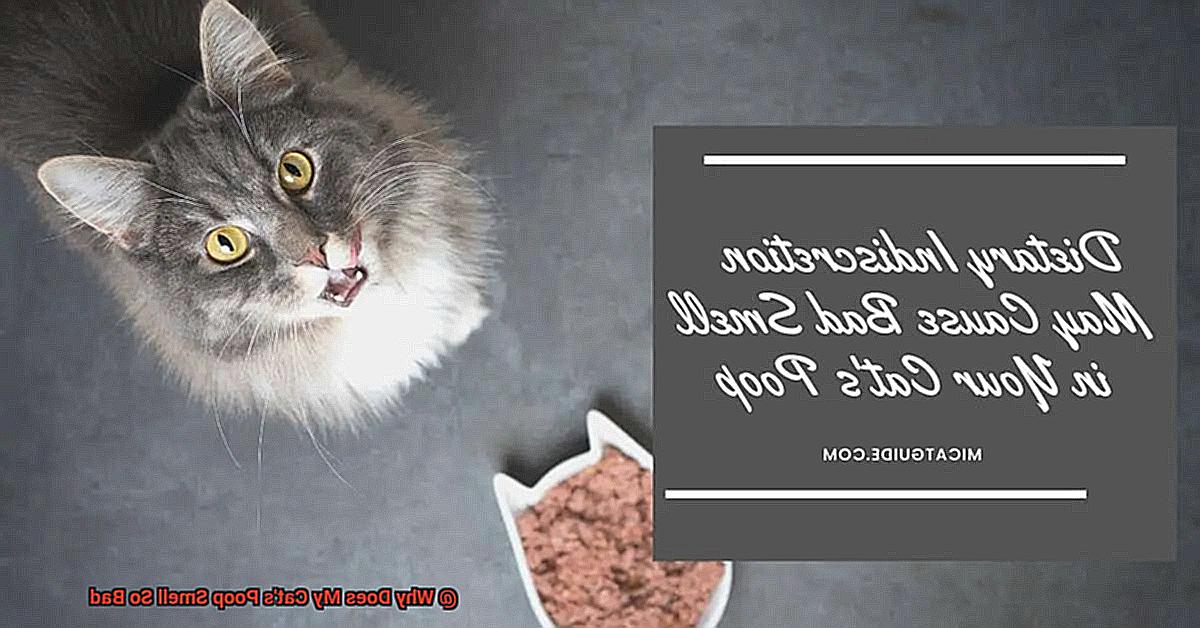Hey there, fellow cat lovers. Let’s face it – cleaning your cat’s litter box can be a pretty unpleasant experience. The overpowering stench of your feline friend’s feces can make you want to hold your breath and run for the hills. But have you ever stopped to wonder why your cat’s poop smells so bad in the first place?
Well, the answer lies in their unique diet and digestive system. As obligate carnivores, cats require a diet high in protein and fat. When they digest this type of food, it produces sulfur-containing amino acids that can create an extremely unpleasant odor in their feces. And if your kitty has any health issues or recent dietary changes, these factors can also contribute to the stinkiness of their poop.
But don’t worry – there are plenty of solutions to help eliminate that nasty smell from your home. By making simple changes to your cat’s diet or litter box setup, you’ll be able to significantly reduce the foul odor and enjoy a fresher-smelling living space.
In this blog post, we’re going to dive deep into why your cat’s poop smells so bad and provide you with practical tips on how to keep your home smelling clean and fresh. So if you’re ready to say goodbye to those unbearable whiffs once and for all, stick around. We’ve got everything you need to know right here.
What Causes Bad-Smelling Cat Poop?

Understanding the causes behind this issue will help you address it and keep your feline friend healthy and happy.
Poor Quality Diet
Commercial cat food that contains low-quality ingredients like fillers, artificial preservatives, and by-products can lead to digestive issues and foul-smelling feces. These foods are often high in carbohydrates, which cats cannot digest well, resulting in bacterial overgrowth in the intestines and a pungent smell emanating from your cat’s litter box.
Moreover, a diet deficient in essential nutrients like fiber, vitamins, and minerals can also contribute to this problem. These nutrients play a vital role in maintaining your cat’s digestive health. A lack of fiber can cause constipation, leading to harder stools that are challenging for your cat to expel.
There are plenty of ways to prevent this issue. The first step is feeding your cat a healthy diet that contains all the essential nutrients they need. Opt for cat foods made from high-quality ingredients like whole meats, vegetables, and fruits. Avoid those that contain by-products or fillers as these can cause digestive issues and other health problems.
Ensuring your cat has access to clean water at all times is also crucial. Dehydration can contribute to smelly feces, so it’s essential to keep your cat hydrated. If your cat isn’t drinking enough water on their own, consider adding wet food or extra water to their diet.
Eating Too Much or Too Quickly
Cats have a natural instinct to eat whenever food is available, but overeating or gorging can lead to digestive issues and an upset stomach. This can result in foul-smelling feces that are not only unpleasant for you but also uncomfortable for your cat.
Additionally, the quality of the food your cat eats can also play a role in the smell of their poop. Some cat foods contain fillers or additives that can cause digestive problems and lead to smelly feces. To avoid this, it’s essential to choose high-quality cat food that is free of artificial ingredients and fillers.
So, what can you do if you notice your cat’s poop smells particularly bad or they seem to be eating too quickly?
First, consider adjusting their feeding habits by offering smaller portions more frequently throughout the day. This will help prevent gorging and aid digestion.
Secondly, switch to a higher quality cat food to improve their digestion and reduce the smell of their feces.
Health Problems
As much as we love our feline friends, the smell of their poop can be quite unpleasant. However, did you know that smelly cat poop could indicate underlying health problems? In this post, we’ll discuss the various health issues that may lead to foul-smelling feces in cats.
Digestive issues are one of the most common causes of smelly cat poop. Cats with digestive problems may have trouble digesting their food, leading to diarrhea or constipation and strong-smelling feces. You can help your cat by providing them with high-quality cat food without fillers or additives and adjusting their feeding habits. If digestive issues persist, consult your veterinarian for further advice.
Another cause of bad-smelling cat poop is an infection or parasite infestation. Bacterial or viral infections that affect the gastrointestinal tract can lead to unpleasant-smelling feces. Similarly, worms and other parasites can also cause digestive problems and foul-smelling poop. If you suspect your cat has an infection or parasite infestation, seek veterinary care immediately.
Dietary issues can also contribute to smelly cat poop. If a cat’s diet is not properly balanced, it can lead to digestive upset and strong-smelling feces. Additionally, if a cat eats something they shouldn’t, such as spoiled food or garbage, it can cause a temporary issue with the smell of their poop. Make sure to provide your feline friend with a well-balanced diet and keep any hazardous items out of reach.
In some cases, smelly cat poop can be a symptom of more severe health problems like liver disease or cancer. It is crucial for cat owners to monitor their pet’s bathroom habits and seek veterinary care if they notice any significant changes in their cat’s stool odor or consistency.
How to Address the Issue
You know that dealing with bad-smelling poop is an unpleasant reality. Fortunately, there are several ways to address this issue and create a more pleasant home environment for both you and your furry friend. Here are five tips to help you make your home a feline-friendly zone.
Ensure Your Cat’s Health
The first step in addressing bad-smelling cat poop is to ensure that your cat is healthy. Take your cat to the vet to rule out any underlying medical conditions that could be contributing to the odor. Certain health issues, such as gastrointestinal problems or infections, can cause strong-smelling feces.

Evaluate Your Cat’s Diet
The type of food your cat eats can have a significant impact on the smell of their poop. Low-quality cat food can contain fillers and additives that can cause smelly stools. Consider switching to a high-quality, grain-free cat food made with whole ingredients. Also, make sure your cat is properly hydrated by always providing fresh, clean water.
Clean the Litter Box Regularly

Cats are clean animals and prefer a clean litter box. A dirty litter box can lead to odors lingering in the air. Scoop out feces daily and replace the litter every week. Try using an odor-neutralizing agent like activated charcoal or baking soda in the litter box to absorb odors.
Add Supplements to Your Cat’s Diet
Adding probiotics or digestive enzymes to your cat’s diet can help improve digestion and reduce the odor of their stools. These supplements can aid in breaking down food and reducing gas production, resulting in less smelly poop.

Consult with a Veterinarian
If the odor persists even after making dietary and cleaning changes, it may be necessary to consult with a veterinarian. Certain medical conditions such as gastrointestinal issues or infections can cause a strong odor in a cat’s poop. A veterinarian can perform necessary tests and provide treatment options.
Improving Litter Box Hygiene
Cats are wonderful companions, but let’s be honest – their litter boxes can be a bit of a stinky situation. Fortunately, there are plenty of measures you can take to improve litter box hygiene and keep your home smelling fresh and clean.
The first step in improving litter box hygiene is to scoop the litter box at least once a day. This means removing any solid waste and clumps of urine-soaked litter from the box. Leaving waste in the litter box for extended periods can result in the growth of bacteria, which can lead to stronger odors. Regular scooping ensures that your cat has a clean and fresh-smelling place to do their business.
Choosing a high-quality litter designed to control odors is another way to make your litter box more hygienic. There are countless types of litters available on the market – from clay-based litters to natural litters made from wood chips or corn – so you’re sure to find one that suits your preferences and budget. Some litters even contain baking soda or other odor-absorbing ingredients to keep smells at bay.
To further improve the smell of your home, consider placing the litter box in a well-ventilated area. Good ventilation helps reduce the concentration of odors in the air and prevents them from becoming too overwhelming. Avoid placing the litter box in high-traffic areas such as living rooms or kitchens where people tend to congregate.
Cleaning the litter box regularly is essential for maintaining good hygiene levels. Wash the litter box with soap and water frequently, and replace it entirely every six months or so. Plastic can absorb odors over time, making it difficult to remove even with regular cleaning.
The Benefits of a Healthy Diet for Cats
However, the smell of their poop can sometimes be overwhelming. The good news is that feeding your cat a healthy diet can reduce the odor and improve their overall health.
Cats are obligate carnivores and require a diet that is primarily made up of animal protein to meet their nutritional needs. A high protein and low carbohydrate diet is ideal for cats as it helps their bodies digest and absorb nutrients efficiently, resulting in less waste and a less potent odor. So, if you want to keep the smell of cat poop at bay, consider switching your cat’s diet to one that is high in protein.
In addition to reducing odor, a healthy diet also ensures proper hydration. Cats need a high moisture content in their food to stay hydrated and maintain healthy bowel movements. Dehydration can lead to constipation and stronger-smelling feces. Therefore, it’s important to provide your cat with wet food or make sure they have access to plenty of fresh water.
A balanced diet can also help maintain a healthy weight, reduce the risk of urinary tract infections and other health issues, and promote healthy skin and coat. When you feed your cat a healthy diet, you are investing in their long-term health and wellbeing.
IS-2WN07iVQ” >
Signs of Illness in Cats
It could be a sign of an underlying health issue, which is why it’s crucial to be aware of the signs of illness in cats.
One of the most common indicators of illness in cats is changes in bowel movements. If you notice foul-smelling poop or any other changes such as diarrhea, constipation, or blood/mucus in the stool, it’s time to take notice. These symptoms could signify a gastrointestinal problem or parasites.
Changes in appetite and weight loss are also significant signs of illness. If your cat suddenly loses its appetite or shows no interest in food, it could be due to an underlying health condition such as kidney disease, diabetes, or hyperthyroidism. Weight loss can also occur due to various illnesses.
Vomiting is another symptom that cat owners should not ignore. While occasional vomiting is normal for cats, frequent vomiting or vomiting accompanied by diarrhea can be a sign of a serious medical condition such as liver disease or pancreatitis.
Other signs of illness in cats can include lethargy, excessive thirst, and changes in behavior such as hiding or aggression. As a responsible cat owner, it’s essential to keep an eye on your cat’s overall health and behavior and seek medical attention promptly if you notice any concerning symptoms.
Keeping track of your cat’s overall health and behavior is vital to ensure they receive prompt medical attention if needed. Along with other signs such as foul-smelling poop, changes in appetite and weight loss, vomiting, lethargy, excessive thirst, and changes in behavior are all indicators that your furry friend may be unwell.
When to See a Vet for Your Cat’s Poop Odor Problem
If you notice that your cat’s poop odor is particularly bad and is accompanied by other symptoms such as diarrhea or vomiting, it could be a sign of an underlying health issue.
One possible cause of bad-smelling cat poop is a gastrointestinal problem, which could be due to an infection, inflammation, or an obstruction in the digestive tract. Another potential cause could be a dietary issue, either due to food intolerances or allergies.
If you’re unsure whether your cat’s poop odor is normal or not, it’s always better to err on the side of caution and take them to the vet. If the bad smell persists for more than a day or two and is accompanied by other symptoms like lethargy or loss of appetite, it’s important to take your cat to the vet as soon as possible.
During your visit to the vet, they will perform a physical exam and may also order some tests like blood work or fecal analysis to determine the underlying cause of the problem. Your vet will also provide you with advice on how to manage the problem and ensure that your cat stays healthy and happy.
Remember, your cat’s poop odor can sometimes be an indication of their overall health. Keeping an eye on their behavior and habits can help catch any underlying issues early on.
Also Read: Why Does My Cat’s Poop Smell So Bad?
Conclusion
In summary, the stench of your cat’s poop can be overwhelming, but it’s important to know what’s causing it to keep your pet healthy and content. Poor diet, dehydration, digestion problems, and medical conditions are all culprits of smelly feces. Fortunately, there are simple solutions to address these issues. A balanced and nutritious diet is key to preventing foul-smelling poop. Also, keeping the litter box clean and adding supplements to their diet can help improve hygiene.
It’s essential to pay attention to any signs of illness in cats because bad-smelling poop could indicate a more severe health issue. Keep an eye out for changes in bowel movements, appetite, weight loss, vomiting, lethargy, excessive thirst, or behavior changes. If you notice any concerning symptoms accompanied by persistent foul-smelling poop lasting more than a day or two, seek veterinary care immediately.
By making minor adjustments to your cat’s lifestyle and monitoring their overall health regularly, you can create a feline-friendly environment that eliminates unpleasant odors while keeping them healthy and happy.







